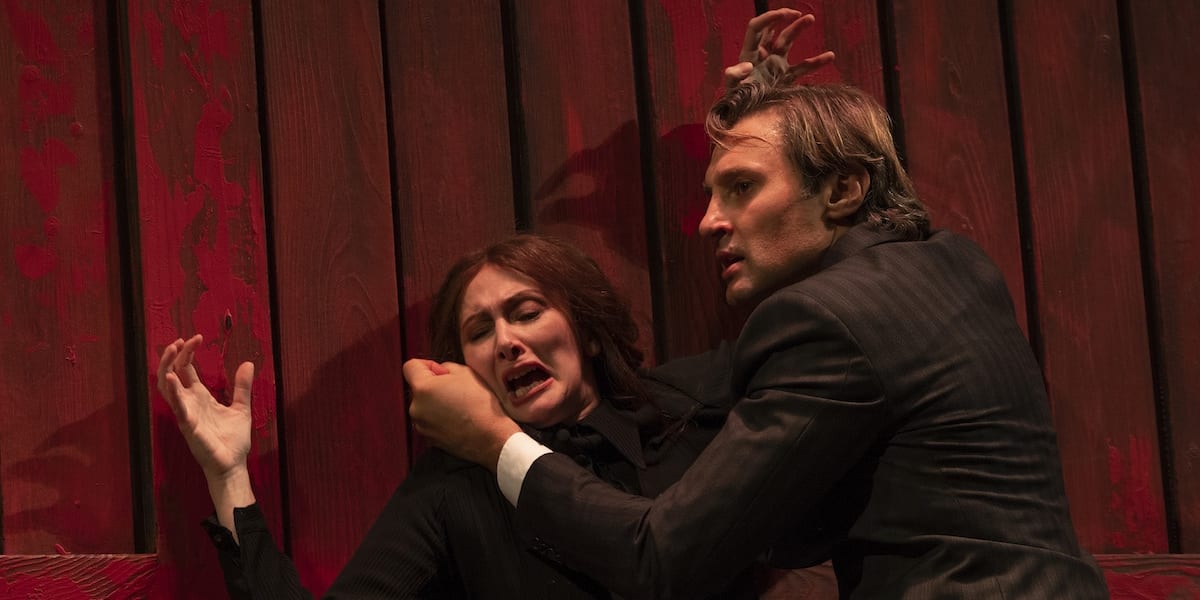Cheek by Jowl’s latest venture into the world of Shakespeare and his contemporaries take the form of a modern-dress, Italian-language version of the most famous of the revenge-tragedy genre. Murderous excess, family intrigues and sharp suits suggest both mafia-inspired movies and the cold slickness of Tarantino, and both of those influences hover over this production, with an added touch of Fellini-style glamour reinforced by music that also harks back to that era.
This is a joint-production with the Piccolo Theatre of Milan staged with all the technical skill, invention, wit and stylish bravura that one has learned to expect from this company. What we have here is a play of simple plot but great variety of incident with each scene accumulating affronts to moral norms and tender consciences all threaded through with a simple theme of (self-)righteous vengeance or VENDETTA, as we informed in the boldest of bold projections right at the start. Vindice (Fausto Cabra) seeks to revenge the murder of his beloved Gratiana by a corrupt and lecherous Duke who heads a family that makes the Sopranos seem a true choir of innocents – sons seeking to displace each other and their parents; a duchess cuckolding the duke with his illegitimate son (the wonderfully named Spurio). And things are little better in Vindice’s own family as his mother turns out to be quite willing to sacrifice her own virtuous daughter to the lecherous heir to the throne. All illusions are stripped away and Machiavelli himself would easily have been outfoxed by these embodiments of unscrupulous vice in action.
What sustains the evening is the lively invention of the language (much of the 1606 original survives in the surtitles), and pacey comic routines that surround each enormity. You could not wish for a more physically re-imagined production from the moment the cast’s catchy conga takes to the stage through to its repeat a couple of blood-soaked hours later. Two episodes stand out. The twice-over murder of the duke covers a gamut of emotions from gothic horror through to slapstick, with a key role played by Gratiana’s skull daubed with arsenic. And Vindice’s (disguised) temptation of his mother is a scene worthy of Tartuffe, played with delicious skill and timing by Cabra and Pia Lanciotti, who also doubles as the lecherous duchess.
The design of the production by Nick Ormerod contributes greatly to its success. A blank blood-coloured wooden wall opens at intervals to reveal court interiors, a prison, a verdant garden, or simple doors. Video projections and a wide range of stylish furniture provide sufficient suggestion of conspiracy, hidden vices and surreptitious crimes. There is a fine flow of action from one event to the next with no need for concentration-breaking scene-shifting by stage managers. The lighting and sound schemes are similarly inventive in adding extra frissons of horror when required.
One of the delights of this play, and indeed of this genre, is that there is great scope for ensemble acting, while also retaining plenty of high-points for individual showmanship for each of the cast. The crowded scenes gather pace and resolve again swiftly with so much going on you want to replay the scene to make sure you have not missed something important from one of the participants; but you also leave thinking that each character has had their say.
In the lead role Cabra is a masterly modulator between thuggish desire for vengeance and insinuating conspiratorial charm. His seductive dialogues with the equally fine Lussurioso (Ivan Alovisio) anticipate Molière in their slippery plausibility of improvised cunning. Massimiliano Speziani as the Duke captures an old man’s hopeless lust within a carapace of guile acquired over a lifetime. He also is made up to look uncannily like Silvio Berlusconi! Among the other sparring sons, Raffaele Esposito, Christian Di Filippo, Errico Liguori, and David Meden all establish differentiated characters quickly alongside a common lust for power and a raw physical presence that can be ordinarily violent or charmingly funny – the scene in which two of the brothers who think they have murdered another then encounter him again very much alive, is elegantly prepared and delivers to the fullest extent.
A play as deliberately ethically confronting as this is hard to bring off today because of the tendency just to push the excess to the nth degree. This production resists that lazy temptation and manages to be tastefully tasteless in a way that entertains and still provokes. Do see it if you can on its European tour.

